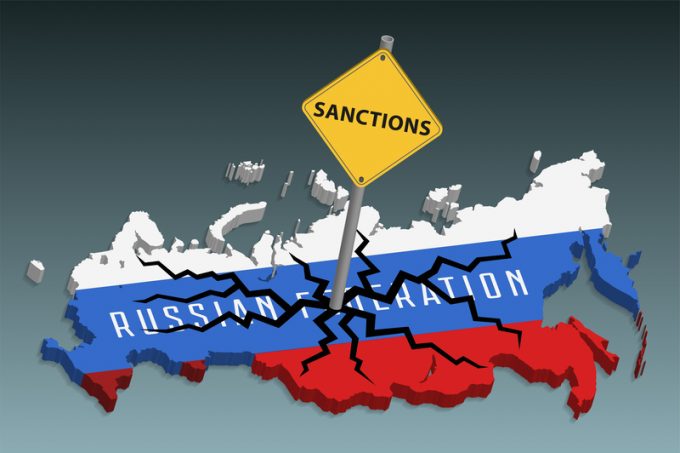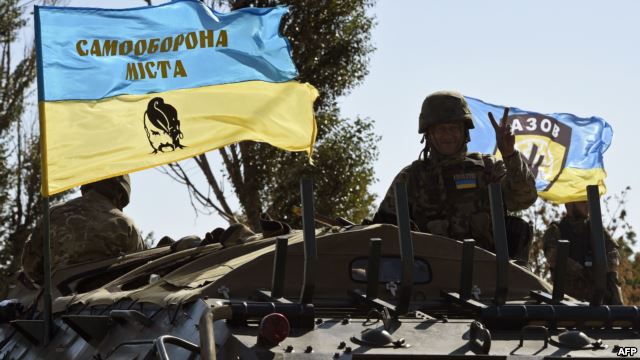The US and the EU have imposed new sanctions against Russia. This time they include economic, or sectoral, sanctions. They are aimed at Russian state banks, the defense sector and the oil industry. Below are the five things that one needs to know about the influence which the western sanctions have on the Russian economy.
Experts note that the first effects from the punishment for supporting the separatists will be felt by the financial and fund markets of the Russian Federation.
They assure that in the long-term the sanctions will cause Russia to lose national competitiveness in the global context.
How painful will the sanctions be for Russia?
The latest round of the sanctions was launched when the Russian economy was already in a shaky state. The events surrounding Ukraine forced investors to become nervous and caused a mass capital outflow from Russia: this outflow constituted 75 billion USD to date this year. This is more than in all of 2013. As a result, the ruble fell 9 percent, and prices on imported goods have grown.
However, new sanctions, which for the first time affect not only individual companies or people, but the Russian economy as a whole, may weaken the economy even more. They will simply dramatically limit the country’s access to Western capital markets and new Western technologies, the two things Russia needs the most in order to encourage the growth of its own economy.
“Our prognosis regarding economic growth in Russia before the new sanctions constituted only 0,2% in 2014, so it was already close to nil,” said the senior economist of the British consulting firm Oxford Economics, Adam Slater.
“With the imposition of these new sanctions, Russia is threatened with negative economic growth this year,” he adds.
Slater thinks that the danger of negative change is not just the result of the direct influence of the sanctions in themselves. The sanctions, which the West is gradually increasing, will scare away investors.
“They are a signal that Russia is a place which should not be invested in. Or investment might be risky, because the sanctions may be increased,” he notes.
Will sanctions have an immediate effect on the Russian economy?
The finance sector of Russia will be the first to feel the influence of the sanctions. Both American and European sanctions will severely limit the access of Russian state banks to western capital markets, which at the moment are their biggest source of foreign financing.
US and EU sanctions prohibit the financing of key state banks of Russia for a period of more than 90 days. This will severely limit the possibilities of the banks to finance their main long-term development projects.
“The majority of the projects necessitate long-term investments, which is very pertinent, taking the current state of the Russian economy into account. However, henceforth the Russian state banks will not have access to such finance,” notes an economist Danske Bank, Vladimir Miklashevsky, who specializes in Russian issues.
The decrease of western investments in state banks may have a palpable effect on the entire Russian economy. On all of its levels there is a dramatic need for finances.
In order to illustrate this, it is enough to present the numbers of Russian loans at foreign markets. The UK publication Financial Times writes on July 30 that Russian state banks in the next 12 months will have to return approximately 33 billion USD in foreign loans and credits. The Russian financial sector will have to return 41 billion USD druing this period. Private companies and banks – 87 billion.
What will be the long-term effect of the sanctions?
The long-term effect of the sanctions will mostly touch on the fuel industry. Sanctions which limit the access of the Russian energy sector to new western technologies have been imposed. In the short-term this will not have a detrimental effect, however in the long-term, it will negatively influence the competitive capabilities of the Russian economy.
Sanctions do not touch on the gas sector of the Russian economy, which supplies about one-third of EU needs for gas import. However they directly affect the oil sector, whose growth stimulated the renewal of Russian industry after the fall of the USSR.
The limit access to western drilling technologies may be especially painful, as Russia is developing carbon sources in the Arctic, as well as shale gas reserves, which may replace the exhausted oil resources in Siberia.
Can Moscow find an alternative to the West?
The West is hoping that its sanctions against Russia will be successful. Moscow will be unable to find according finance and technology sources anywhere.
The Kremlin already tried to destroy such hopes on part of the West, having started the search for new capitals and fuel markets in other parts of the world, in particular, China. They also tried to reinforce the positions of BRIC countries. These countries agreed to establish a joint development bank in March.
However, finance experts claim that Asian capital markets cannot supply the Russian economy with all its investment needs. The matter is that the Asian markets are dominated by state investors, and not private ones. The latter are the ones who provide the flexibility and broadness of the opportunities on western markets.
“Private investors are more prepared to take on additional risks, they are interested in most of the sectors. Meanwhile the state investors from China, big state-owned corporations, have much narrower interests,” explains Miklashevskiy. “They might be interested in the fuel sector, however, but definitely not retail sales.”
It seems Asia will be unable to provide Russia with modern technologies that western oil companies have.
“Chinese companies will be unable to help and provide shale gas extraction technologies, which the western countries used to be able to supply. Now these opportunities have been blocked,” notes Foreign Affairs Council expert from New York, Michel Levy. “China can provide capital, people. But it cannot fill in the blanks in technologies.”
Will the sanctions not cause losses for the US and the EU?
After Brussels recently announced new sanctions against Russia, officials from some EU countries warned their citizens that they would possibly have to pay the economic price for the imposition of the sanctions on the Russian Federation, the third-biggest trading partner of the European Union.
British Foreign Affairs Minister Philip Hammond noted that it might be “painful,” however it is worth it to “reign in Russian aggression.”
Online publication EU Observer, which reports on EU policies, cited an EU diplomat, who during a private conversation on July 28 said that the EU commission is expecting the following losses: 40 billion Euro this year, 50 billion Euro next year. It is expected that Russia will respond with a ban on trade of certain European goods.
In light of such predictions, the Russian control agency, Russian Agricultural Service, on July 30 declared a ban on the import of most of the fruits and vegetables from Poland. Every year, Russia would buy fruit and vegetables from the EU with a value of over 2 billion Euro. They are denying that this decision regarding Poland is somehow tied to the sanctions.
However, despite all this, the difficulties every individual EU country might face are meager in comparison to those Russia will suffer. The info graphic offered by German publication, Der Spiegel, shows that export to Russia constituted less than 4% of the entire foreign trade for most EU countries and constituted over 10% only for the countries which border the Russian Federation.
Many EU member states will become vulnerable in relation to Russia should it resort to economic war. However they assure that the Kremlin needs to preserve the European market as its most profitable and important. This will constrain it from starting this kind of direct conflict.
Less than one percent of US export goes to Russia. Furthermore, this country does not import Russian gas or oil. All of this ensures America’s safety from the influence of responsive negative steps on part of Russia.
Source: Svoboda
Translated by Mariya Shcherbinina, edited by Myron Spolsky





